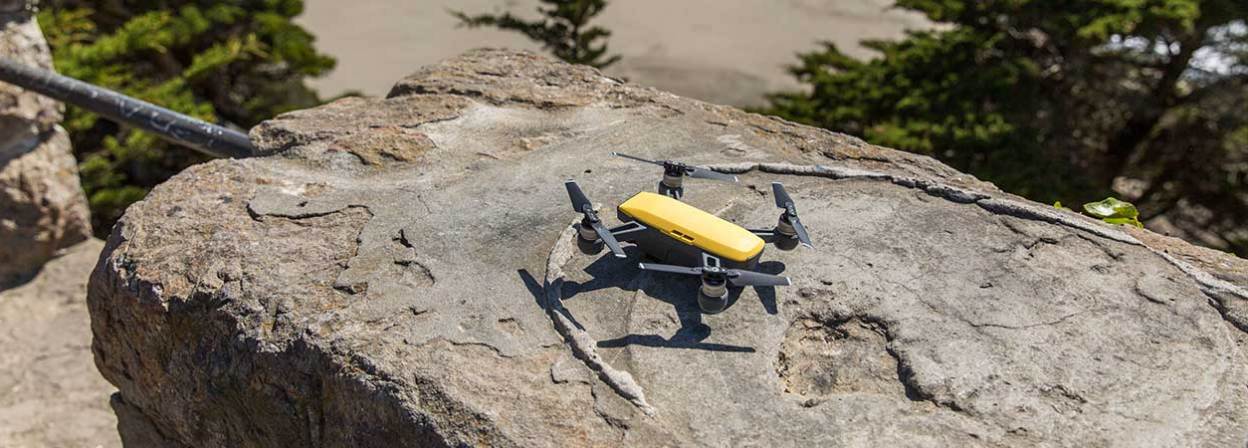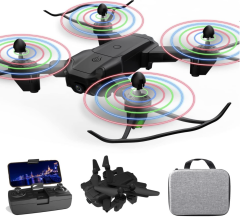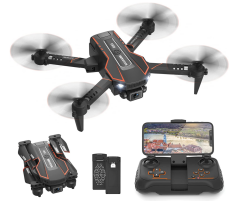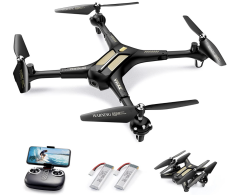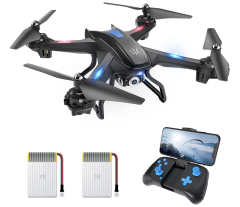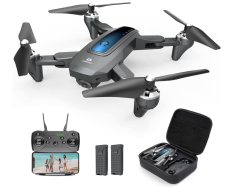Buying guide for best drones under $100
The unmanned aerial vehicle (UAV), or drone, continues to be one of the hottest tech items on the market. If you’ve always wanted to slip behind the controls of one but balked at the thought of plunking down hundreds (or thousands) of dollars for something that you were probably going to crash into a tree, this guide is for you.
There is a wide variety of full-featured drones now available for less than $100. While you won’t get the range or feature set of a more expensive option, an inexpensive drone is the perfect choice if you’re just starting out. It’s generally easier to operate than its pricier counterparts yet sturdy enough to withstand a variety of novice pilot mishaps. The majority also pack features that you might be surprised to find at this price point.
This guide will walk you through some of the features and capabilities you can expect to find in a drone under $100, in addition to some more general considerations when comparing UAVs. We also recommend several models, so you can spend more time learning to navigate around trees and less time worrying about finding a drone that matches your needs.
Key considerations
Construction
Try to find the sturdiest drone you can, particularly if you’re just beginning. It should be reinforced to withstand impacts suffered either while flying or transporting it. A compact, lightweight drone is easier to carry around and fly, but be careful it isn’t too light or you could lose control of it in even the mildest wind.
Range
The flying range is the distance the drone can go before you start to lose control of it. You’re not going to see a tremendous flying range with drones at this price, but there can still be considerable differences among models. These drones are generally able to fly from 15 meters to 100 meters or so. Buy a drone with the longest range you can afford to give yourself more flying and photo/video options.
Controls
Any drone is going to be a handful when you’re first learning to fly it, but the makers of drones in this price range largely take the novice pilot into consideration with features that make the UAVs easier to handle. A feature called headless mode (which we cover below) helps you orient the drone, while multiple speeds enable you to start more slowly and gradually go faster as you gain more experience and confidence. Another feature, called one-key landing, can also save the day (and the drone) if your flight goes completely sideways.
Features of drones under $100
A drone with fewer features can be a plus for beginning flyers because you’re able to concentrate on the physics of keeping the drone in the air without being overwhelmed by extra bells and whistles.
Camera
First and foremost, you buy a drone to fly it, but in terms of features, the camera towers above all others. Not all drones in this price range come with a camera, but most will have some form of camera to take photos and videos. It’s the “some form” that varies a bit.
First, don’t expect the professional-grade photos and video that a more expensive drone will give you. Cameras on drones in our price range start at around 480p and top out at around 2MP, but this top end is the exception. The majority will be in the 720p range. Some feature extra perks like a wide-angle lens, but “no frills” is the general rule.
The other primary consideration is how the photos and video are stored after you take them. Drones with WiFi capabilities will work with your mobile device, letting you see and store media real-time on your phone. For those that don’t, you’ll store the media on the drone, usually on a microSD card. If this is the case, know how much storage the drone comes with and whether (and by how much) it can be upgraded.
One-key takeoff and landing
With this feature, you can easily launch and retrieve a drone with the push of a button. This is a great option for beginners because you can quickly and effortlessly ward off a spectacular crash or cancel an errant flight path.
Controller
A gaming console-like device is the classic way to fly a drone, but these controllers are being replaced by apps that let you use your smartphone in addition to or in place of a controller. This is a great way to both see what the drone sees in real time and easily store video and still images from the camera.
Headless mode
With headless mode, you don’t need to worry which way the drone is facing because your controller is the basis for the drone’s orientation. In other words, whichever way the controller is pointing is the way the drone is pointing. This will help you master all aspects of drone flight, and as such it is one of the top features that beginners should consider.
Battery
This section could also be labeled “How long will the flight last?” Battery life/flight time isn’t that great for drones in general, but in drones at this price a flight time of less than ten minutes is common. A low-battery warning on the remote/controller will give you a heads-up when the battery is running low so you know when to bring the drone in for a landing. Research how long a charged battery will last, as well as how long it will take to recharge. Most drone batteries take from one to two hours to fully recharge.
Did you know?
Drones with built-in LED lighting will be easier to locate in low-light flying conditions.
STAFF
BestReviews
Extras
This is another area that you can use to differentiate one drone from another. Some common extras to watch for include the following:
-
Extra batteries
-
Battery charger
-
Spare propellers (Propellers are the weak link in drones, and having extras is a real plus.)
-
Tools for quick repairs (such as a screwdriver)
-
Carrying case
Drone prices
The category is “Drones under $100,” so we already know what the ceiling is here. These drones start at less than $50, and at that price you’ll generally find models with a shorter range and flight time and fewer features. Most drones fall in the $60 to $100 range. At this price, a close examination of capabilities and feature sets will be necessary to determine which is right for you.
Tips
-
Shop around to find the right drone for you. If acrobatics are important, look for a drone that is specifically constructed to perform flips and rolls (check the product description). If you’re left-handed, look for a drone with a controller that gives you the option of right- or left-handed operation.
-
Inspect the drone’s battery carefully before charging it. If the battery is pierced, swelling, or leaking, discard the battery and do not attempt to charge it.
-
Avoid flying your drone on windy days. This is especially important if your drone is very lightweight. Controlling a lightweight drone is nearly impossible in gusty conditions.
-
Do not fly your drone above 400 feet. The Federal Aviation Administration (FAA) has guidelines for flying drones on the faa.gov website.
-
Let your drone rest between flights. This will cool it down and protect the motors. You should also only charge the battery after the drone has rested.
- Try virtual reality. Drones that are VR capable can be used with VR headsets for an even more immersive experience.
Other products we considered
There is such a wealth of options in this rapidly growing field that we wanted to share a couple more drones that we like. The first is the Holy Stone HS170 Predator Mini RC Quadcopter. This UAV offers a great feature set at an economical price, and its fast charge time (under an hour) will have you back in the air in a hurry. The Force1 U45WF Quadcopter offers features rarely seen at this price point, such as a custom route mode that allows you to trace out a path on the screen that the drone then follows. We also love that this drone ships with three batteries to greatly extend your flying time.
FAQ
Q. What am I missing out on by buying a less-expensive drone?
A. Drones in this price range offer a variety of features and are great for beginners, but they really can’t compete with drones priced in the hundreds or even thousands of dollars. These drones offer longer flying times, faster speeds, more power, greater range (some measured in miles!), as well as more robust cameras and advanced features such as GPS and obstacle sensing.
Q. Do I need a license to fly a drone?
A. The law is a bit murky here in terms of licenses and registering of drones, and as such your best bet is to check local regulations and brush up on the latest requirements from the FAA. In general, you won’t need a license if you’re flying a drone recreationally and the drone weighs under 55 pounds. Anything heavier than that and you might need to register it. If you’re trying to earn money with your drone, you’ll need to be licensed. The FAA is more than willing to fine or even jail those who violate drone rules, so this is definitely not an area you should ignore.
Q. Where can I fly my drone?
A. Sadly, the list of places where you can’t fly it is going to be significantly longer, but in general, try to find an open area with no people around. Avoid residential neighborhoods, commercial areas, schools, events of all kinds, people, and airports (stay five miles away from these). Again, you’ll find more detailed information on the FAA website.

